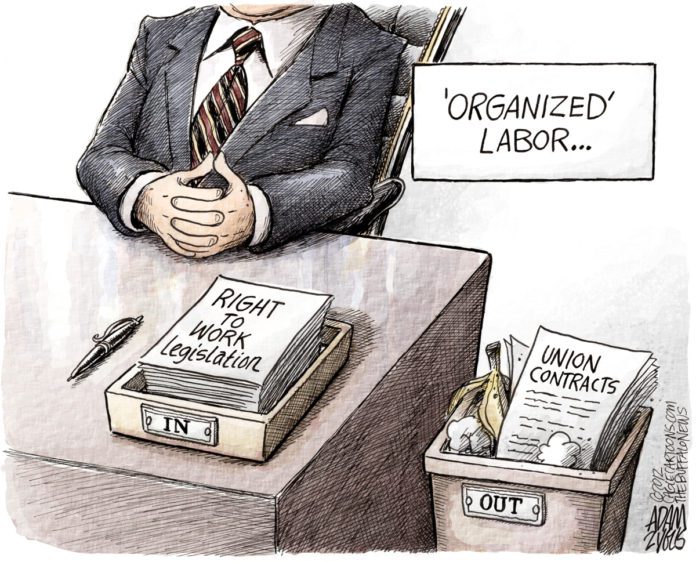BY MIKE W. RAY
 The decline in union membership in Oklahoma, and state pre-emption of local control in several critical areas, were among the issues discussed during the latest Oklahoma Observer Newsmakers program.
The decline in union membership in Oklahoma, and state pre-emption of local control in several critical areas, were among the issues discussed during the latest Oklahoma Observer Newsmakers program.
State Rep. Cory Williams, D-Stillwater, and Jimmy Curry, president of the Oklahoma AFL-CIO, also pointed out several dramatic changes in the state Legislature since term limits went into effect 12 years ago.
Curry and Williams were the featured speakers Aug. 25 for the Newsmakers Series held at Full Circle Books in northwest Oklahoma City, sponsored by Oklahoma Observer owner/editor Arnold Hamilton.
Union membership in Oklahoma has declined from 8.6% of the working population in 1998 to 6.2% of the labor force today, or approximately 110,000 workers, Curry said. Although unions are credited with imposition of limits on child labor, ensuring that workers receive a living wage, and adoption nationwide of the eight-hour standard workday, the prevailing attitude in Oklahoma toward unions is one of hostility.
A recent example is the International Machinist and Aerospace Workers union strike at Tinker Air Force Base that has been under way for an entire month, yet not one word about it has appeared in Oklahoma’s largest newspaper.
Curry focused on the workers’ compensation “reform” law the Republican-controlled Legislature enacted in 2013. SB 1062 switched Oklahoma from a court-based workers’ comp system to an administrative system. However, several sections of the new law have been ruled unconstitutional and several other sections are in litigation.
Curry related that famous Oklahoma pilot Wiley Post lost an eye in an oilfield mishap in the mid-1920s. Post used his $400 workers’ compensation settlement to learn how to fly and to get his pilot’s license, Curry said.
More recently, Curry continued, a Muskogee man who had worked for a company for 10 years, lost 90% of the vision in one eye because of an on-the-job accident. Subsequently the worker returned to his job at his previous salary, but because of onerous provisions in SB 1062, he received no compensation for the job-related injury to his eye.
The majority of Oklahoma union members are concentrated in Oklahoma City and Tulsa, Curry said, but the Oklahoma AFL-CIO has members across the state. “We represent teachers, nurses, librarians, aircraft mechanics, firefighters, municipal workers, truck drivers, civilian workers at Tinker AFB, and many more,” he said, including about 2,000 of the workers at the Seaboard pork production plant in Guymon.
Oklahoma has lost about 65,000 union jobs since the “right to work” constitutional amendment – Hamilton labeled it “right to work for less” – was adopted in 2002, Curry said. It’s unclear whether RTW was primarily responsible for that decline, or whether other factors had a significant effect, such as the shift nationwide from manufacturing to service industries.
Shifting gears, Williams and Curry discussed the practical effect of legislative pre-emption of “local control.”
– In 2014 the Republican dominated Legislature enacted Senate Bill 1023, a State Chamber-backed measure which prohibits any municipality or subdivision from establishing a mandatory minimum number of vacation or sick days, or a minimum wage rate, that an employer would be required to pay or grant employees.
Hamilton noted that several cities across the nation have imposed minimum wages that are higher than the federally mandated minimum of $7.25 per hour [which was last raised in 2009] in order to boost their local economy. “There are things we could learn from others but we’re unwilling to do so,” Williams said.
– SB 809 adopted in 2015 prohibits municipalities and counties from banning oil and gas exploration, and development of wastewater disposal wells arising from energy production, within their corporate limits.
Consequently, a natural gas compression plant is being constructed in the middle of Tuttle and there’s little that City Hall can do about it. Earlier this month the city manager estimated that approximately $700,000 in damage has been done to Tuttle’s transportation system since oil and gas exploration in the Grady County town started about a year ago, which increased truck traffic and resulted in exceptional wear-and-tear to local roads and bridges.
– Last year the Legislature enacted a law to prohibit municipalities from adopting any ordinance or regulation more strict than state law pertaining to the regulation of knives.
– The Legislature imposed a moratorium in 2002 and 2004 on out-of-state sales of large volumes of water, and HB 1483 enacted in 2009 requires legislative approval of any water-use permit issued by the Oklahoma Water Resources Board to any out-of-state entity.
– The Oklahoma Legislature in 2014 passed HB 2620, which decrees that the registration of any real estate by any city, town, municipality, county, or other political subdivision in Oklahoma “is declared to be a statewide concern” and consequently “shall be prohibited…” The bill torpedoed local efforts to compel absentee landlords to properly maintain rental property that falls into a state of disrepair.
– SB 1438 enacted in 2014 mandates that the Mechanical Licensing Act “shall not apply to … the service, repair and installation of boilers, pressure vessels and welded steam lines which are subject to the jurisdiction of the Commissioner of Labor…” It also decrees that the Mechanical Licensing Act shall not apply to “contractors, the contractor’s employees,” nor to employees of “intrastate gas pipelines” or of “gas gathering pipelines.”
The direct result of SB 1438, Curry said, is that the state’s Construction Industries Board is barred from checking whether workers on the $1 billion project to increase production at the Koch Brothers’ nitrogen plant in Enid have the proper licenses.
– And even earlier, the Oklahoma Legislature in 1999 passed HB 1081 to pre-empt “the entire field of legislation in this state touching in any way inattentive driving and cellular phone usage in automobiles…”
“Many of the members of the majority [political] party in this state ran on a platform of local control,” Williams pointed out. Either state legislators don’t trust their constituents “to make the right decisions,” or the lawmakers “favor special interests,” he added.
The Legislature has changed dramatically since term limits went into effect with the 2004 elections, Williams and Curry both said.
“I kept hearing that politics was corrupt,” Williams said. “But after I got elected, I found that instead it’s rampant with ignorance and political ambition.”
Because legislators are limited to a maximum 12 years in office, power has devolved from the lawmakers to lobbyists, because the latter now have the institutional memory that long-term legislators used to have, Williams said. Corporate lobbyists “pretty much own the Capitol now,” Curry said. Several ex-legislators are now lobbyists or presidents of state colleges/universities. “In many ways, term limits have been detrimental to the state,” Williams said.
The general public’s knowledge of what transpires at the state Capitol is rather shallow, Williams indicated.
Many voters and legislators alike “get more politically invested in distractions” – such as the court-ordered removal of the Ten Commandments monument from the north side of the State Capitol [where it was largely concealed from public view], gun issues, whether Islamic Sharia law might potentially be accepted in Oklahoma courts, and transgender bathroom usage – “than they do about earthquakes shaking their homes, or the loss of local control, or the Legislature giving away hundreds of millions of dollars in tax credits and rebates to the oil and gas industry,” Williams said.
“You have to leave logic at the metal detector when you pass through the Capitol doors,” he quipped.
– Mike W. Ray is media director for the Oklahoma House Democratic Caucus








